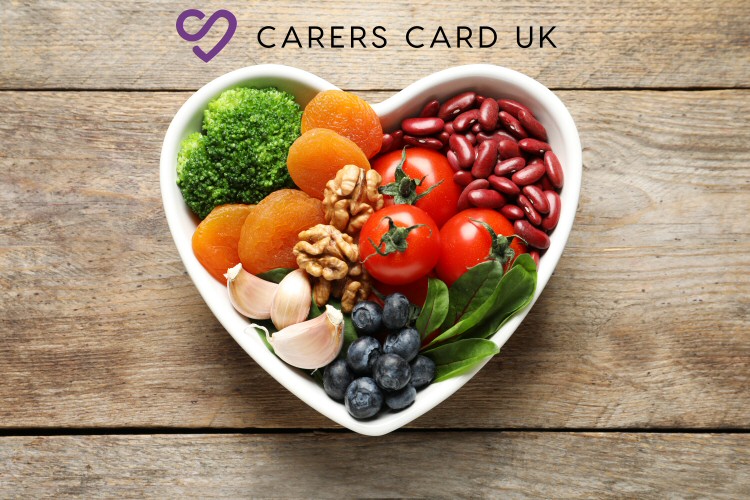The Vital Role of Diet and Nutrition in Caregiving
Caring for someone in need is a multifaceted responsibility that extends beyond emotional support and physical assistance. One often overlooked aspect of caregiving is the critical role of diet and nutrition in maintaining the health and wellbeing of both the caregiver and the individual receiving care. In this article, we'll explore why prioritising diet and nutrition is essential when caring for someone and how making informed dietary choices can enhance the quality of care and overall wellbeing for everyone involved.

Physical Health and Vitality
Proper nutrition is the cornerstone of good health and vitality. As a caregiver, you need ample energy and strength to meet the demands of caregiving effectively. Ensuring that both you and the person you're caring for receive adequate nutrition is essential for sustaining physical health and preventing illness. A balanced diet rich in fruits, vegetables, whole grains, lean proteins, and healthy fats provides essential nutrients, vitamins, and minerals necessary for optimal functioning of the body's systems.
Promotion of Healing and Recovery
For individuals recovering from illness, injury, or surgery, proper nutrition is paramount for promoting healing and facilitating recovery. Certain nutrients, such as protein, vitamin C, zinc, and omega-3 fatty acids, play key roles in supporting immune function, tissue repair, and cellular regeneration. By providing nourishing meals and snacks that meet the nutritional needs of the person you're caring for, you help optimise their body's ability to heal and recover more quickly.
Management of Chronic Conditions
Many individuals requiring caregiving support may also be managing chronic health conditions such as diabetes, hypertension, heart disease, or gastrointestinal disorders. Dietary modifications tailored to specific health needs can help manage symptoms, stabilise blood sugar levels, regulate blood pressure, and reduce inflammation. Working closely with healthcare professionals to develop a nutrition plan that addresses the unique dietary requirements and health goals of the person you're caring for is essential for effectively managing chronic conditions and promoting long-term health and wellbeing.
Prevention of Malnutrition and Dehydration
Malnutrition and dehydration are common concerns among older adults and individuals with chronic illnesses or mobility limitations. As a caregiver, it's important to monitor food and fluid intake to prevent these conditions from occurring. Encouraging regular meals and snacks, providing hydration throughout the day, and offering nutrient-dense foods can help prevent malnutrition and dehydration, which can lead to serious health complications if left untreated.
Enhancement of Cognitive Function
Proper nutrition not only supports physical health but also plays a crucial role in cognitive function and brain health. Certain nutrients, such as omega-3 fatty acids, antioxidants, and vitamins B6 and B12, have been shown to support cognitive function, memory, and mood regulation. Including foods rich in these nutrients, such as fatty fish, nuts, seeds, leafy greens, and whole grains, can help maintain cognitive function and reduce the risk of cognitive decline associated with aging or neurological conditions.
Emotional Wellbeing and Quality of Life
Food is not only fuel for the body but also a source of comfort, enjoyment, and social connection. Sharing meals together can be a meaningful way to nurture emotional wellbeing, foster social bonds, and enhance the quality of life for both the caregiver and the person receiving care. Taking the time to prepare and enjoy nutritious meals that are flavourful, visually appealing, and culturally meaningful can contribute to a sense of joy, satisfaction, and normalcy amidst the challenges of caregiving.
Self-Care and Resilience for Caregivers
As a caregiver, prioritising your own nutrition is equally important for maintaining your health, resilience, and ability to provide care effectively. Eating balanced meals, staying hydrated, and practicing mindful eating habits can help replenish your energy, reduce stress, and prevent burnout. Remember to carve out time for self-care and nourishment, even amidst the demands of caregiving, as caring for yourself is essential for sustaining your capacity to care for others.
In conclusion, diet and nutrition play a fundamental role in caregiving, influencing physical health, emotional wellbeing, and quality of life for both caregivers and care recipients. By prioritising nourishing meals, promoting healing and recovery, managing chronic conditions, preventing malnutrition and dehydration, enhancing cognitive function, fostering emotional connections, and practicing self-care, caregivers can create a supportive environment that promotes health and wellbeing for everyone involved in the caregiving journey. Remember, food is not just sustenance—it's a powerful form of care and nourishment that can profoundly impact the lives of those we care for.
Posted: 01/03/2024
